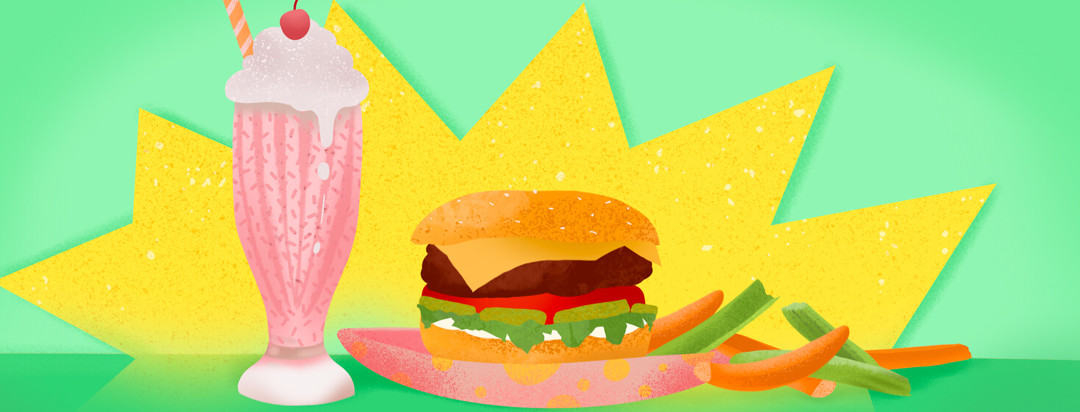Nutrition Tips For Parents Of Children With CF
A child with cystic fibrosis (CF) generally needs to eat more food than other children into their diet in order to stay healthy. Cystic fibrosis, an inherited genetic disorder caused by a mutation on chromosome 7, affects the epithelial cells, specifically those in the lining of the lungs, pancreas and sweat glands.1,2 CF causes an imbalance in salt and water in the body. When this happens, the body produces a thick mucus, which can coat the lungs and prevent the intestines from absorbing essential nutrients. That interferes with weight gain.1,2
CF causes difficulty digesting and absorbing fat.1 Children and teens with CF are often underweight and may have trouble growing because of malabsorption. They require extra calories, particularly from fat and protein to help them grow and prevent illness. Caloric intake can be as much as 4,500 calories a day, more than twice the usual recommended daily limit, depending on their particular needs.2
Diet options for children with cystic fibrosis
Like other children, those with CF should eat a balanced diet that includes whole grains, fruits and vegetables, dairy products, and protein.2 High-fat, high-calorie foods and snacks; foods with extra salt and low in sugar, can benefit children and teens with CF.1,2
Good food choices can include cheeseburgers, pizza with extra cheese and vegetables, eggs, sandwiches with all the toppings, drinking milkshakes and eating desserts made with dairy and topping them with whipped cream.1,2
Extra salt is also important because children with CF lose more salt in their sweat than others do. Keep a saltshaker on the table, allow salty foods and snacks like pretzels, french fries, pickles, and deli meats.1
What to add to your child's diet*
- Extra butter and oil to bread, vegetables, salads, and any pan you are cooking in
- Mayonnaise and mustard to salads and sandwiches or baking fish or chicken
- Sour cream to dips, vegetables, and cakes
- Whipped cream to top fruit, desserts and hot chocolate
- Dips and dressings
- Cheese to eggs, sandwiches, and pasta
- Nut butters to crackers, sandwiches and smoothies
- Milk, cream, and yogurt to breakfast, sauces and baking
- Protein powder or nutrition supplements to drinks and smoothies1-2
*Confirm any changes to your child's diet with their cystic fibrosis care team.
How often should kids eat?
Kids with CF should eat 5-6 times a day. Three meals plus snacks can provide enough calories to help children grow and develop more normally.1 Offering high energy snacks like seeds, nuts, grains, protein bars, cheese sticks, and vegetables can be easily carried to school and don’t need refrigeration. Smoothies can be enriched with protein powder, yogurt, and even avocado. They can be consumed as snacks or as part of a meal.1,2
Cystic fibrosis dietician
There are specially trained dietitians who can help you plan the best nutritional program for your child, accommodating any special needs. If your child suffers from malabsorption there are vitamins and enzymes that can be prescribed to help them maximize the benefits of what they are eating. A dietician and your health care team can accommodate the specific needs and likes of your particular child.1,2
Pancreatic enzymes
Pancreatic enzymes may be prescribed to help your child to better digest food, particularly fat, starch, and protein. This will help with pancreatic insufficiency, the lack of enzymes from the pancreas that help the intestines work properly.2 Pancreatic insufficiency can interfere with growth and weight gain and cause bad-smelling bowel movements.2 Supplemental enzymes are taken when eating meals to help food digest properly.1,2
Vitamins
Vitamins are important for everyone’s normal growth and development. Children with CF may not get enough vitamins A, D, E, and K. These are fat-soluble vitamins which are normally digested as part of fat absorption.1 There are vitamins specially formulated for children with CF. Your healthcare team can advise on what is right for your child.
Getting enough iron and calcium is important when a child’s bones are growing. Zinc can help support the immune system and ability to heal wounds.1
Feeding tubes
Children with cystic fibrosis who simply can't get enough food into their diet to support normal growth and development may require supplemental feedings. These are done through two kinds of feeding tubes. A NG tube, nasogastric, is a tube inserted through the nose into the stomach. A longer-term approach to supplemental feeding involves a G-tube (gastrostomy). This is a tube that is inserted into the stomach during a surgical procedure that can accommodate enhanced formulas which add up to 2,000 calories in an overnight feeding.1
Read on to "How to Encourage Your Child with CF to Eat."

Join the conversation